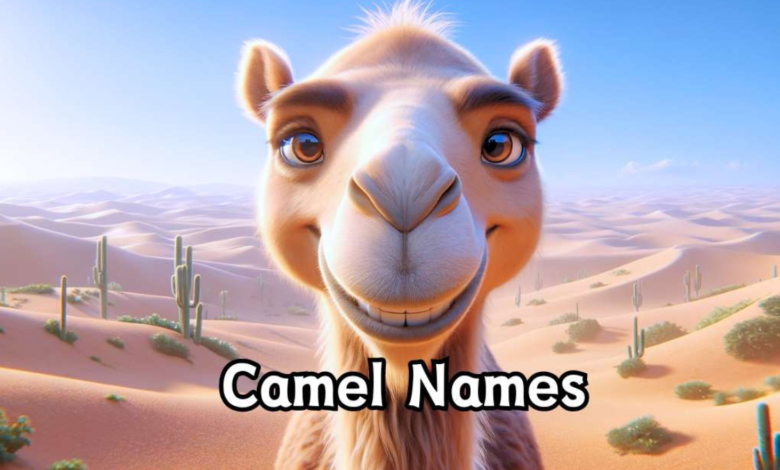Everything You Need to Know About Camel Names

Camel names have long been integral to many cultures around the world, particularly in arid and semi-arid regions. These magnificent creatures, often referred to as the “ships of the desert,” are not just practical animals for transport and survival, but also have rich histories and traditions tied to them. One interesting aspect of camel culture is their names. Just as with pets and livestock, camels often have unique names that reflect their characteristics, roles, or the culture of their owners. This article delves into the fascinating world of camel names, exploring their significance, origins, and how they vary across different cultures and regions.
The Significance of Camel Names

Camel names are more than mere labels; they often carry deep cultural and personal significance. In many cultures, a camel’s name can reflect its physical characteristics, behavior, or even the circumstances of its birth. For example, a camel might be named after a distinctive mark on its body or a notable trait, such as “Black Spot” or “Speedy.” These names serve not only as identifiers but also as expressions of the camel’s role in the owner’s life.
In regions where camels are central to daily life, such as in the Middle East and parts of Africa, camel names can also signify the animal’s value or status within the community. A camel named “Goldie” might indicate that the animal is particularly prized or valuable. Additionally, names can reflect the camel’s relationship with its owner, highlighting the deep bond that can develop between humans and these remarkable animals.
Moreover, in some cultures, camel names are chosen based on traditional beliefs or superstitions. For instance, certain names might be believed to bring good fortune or protection, reflecting a cultural belief in the power of names to influence the animal’s life or fate.
Traditional Camel Naming Practices
Traditional camel naming practices vary widely around the world, often influenced by local customs, languages, and cultures. In Bedouin cultures, for example, camels are often named using a combination of descriptive terms and personal significance. Names might describe physical traits, like “White Star” for a camel with a distinctive white mark, or they could be more symbolic, reflecting the camel’s importance in the owner’s life, such as “Pride” or “Noble.”
In contrast, some cultures use more practical naming conventions, focusing on the camel’s function or role within the herd. For instance, a camel used primarily for carrying goods might be named a packhorse,” while one known for its speed might be called “Swift.” These names serve to quickly convey the camel’s primary attributes or duties.
Additionally, naming conventions can also be influenced by the camel’s lineage or heritage. In some cultures, camels are given names that reflect their family or breed, emphasizing their pedigree and the importance of maintaining high-quality livestock. This practice can also help in tracking the camel’s lineage and ensuring the continuation of desirable traits within the herd.
Modern Trends in Camel Naming
As societies evolve and modernize, so too do the practices surrounding camel names. In contemporary times, camel naming trends can be influenced by globalization and exposure to different cultures. For instance, camel owners might choose names inspired by popular culture, celebrities, or even modern technology. Names like “Turbo” or “Star” might become more common as people seek to reflect current trends or personal interests.
The rise of social media and the internet has also played a role in shaping camel naming trends. Camel owners who share their animals online might choose names that are catchy or memorable to attract attention and engagement from their audience. This could lead to the popularity of names that are unique or trend-driven, reflecting the influence of digital culture on traditional practices.
Additionally, modern camel owners might also adopt naming practices from other cultures or regions, leading to a greater diversity of names and a blending of traditional and contemporary influences. This cross-cultural exchange can enrich the naming process, allowing for a wider range of creative and meaningful names for camels.
Camel Names Across Different Cultures
Camel names vary greatly across different cultures, each reflecting unique aspects of the people who use them. In Arabic-speaking countries, for instance, camel names often reflect traditional values and characteristics. Names like “Hadiya” (gift) or “Mufeed” (beneficial) might be used to emphasize the camel’s importance to its owner. The naming conventions can also be influenced by regional dialects and cultural practices, resulting in a rich diversity of names.
In African cultures, camel names might reflect the animal’s role in the community or its physical attributes. Names like “Kubwa” (big) or “Mchanga” (dusty) can provide insights into the camel’s characteristics or environment. Additionally, some African cultures have specific naming ceremonies or rituals associated with camels, highlighting their cultural significance.
In contrast, in Western countries where camels are less common, names might be chosen based on more personal or whimsical preferences. Names like “Coco” or “Bambi” might be chosen for their endearing qualities rather than traditional significance. This reflects a different approach to camel naming, influenced by cultural differences and the camel’s role in society.
The Role of Camel Names in Livestock Management
In livestock management, camel names can play a crucial role in organizing and tracking individual animals within a herd. Effective naming conventions can help farmers and herders manage their camels more efficiently, whether for breeding, training, or health purposes. Names that reflect the camel’s lineage or characteristics can assist in identifying the animal’s background and attributes, making it easier to track its performance and health.
For example, a camel named “Champion” might be noted for its superior qualities, making it a valuable asset in breeding programs. Similarly, names that denote specific traits or roles can help in assigning tasks or managing the camel’s care. This practical approach to naming can enhance the overall efficiency of livestock management and contribute to the success of camel-based enterprises.
Additionally, camel names can also play a role in record-keeping and documentation. Detailed records that include the camel’s name, lineage, and performance can be invaluable for breeding programs, health management, and other aspects of livestock management. Names that are descriptive and meaningful can aid in maintaining accurate records and ensuring the successful management of camels.
Naming Ceremonies and Rituals
In some cultures, naming a camel is not just a simple process but involves elaborate ceremonies and rituals. These naming ceremonies can vary widely, reflecting the cultural traditions and significance of the camel within the community. For example, in some Bedouin cultures, a camel might be named in a special ceremony that involves family and community members, emphasizing the camel’s importance and the bond between the animal and its owner.
These ceremonies might include traditional practices such as offering prayers, performing rituals, or even giving gifts to mark the occasion. The naming process can be accompanied by celebrations or gatherings, highlighting the cultural significance of the camel and the respect afforded to the animal.
In other cultures, naming ceremonies might be more private but still carry significant meaning. The choice of name might be guided by cultural beliefs or personal preferences, reflecting the camel’s role or attributes. Regardless of the specific practices, these ceremonies underscore the importance of the camel in the owner’s life and the deep connection between humans and their animals.
The Evolution of Camel Naming Practices
Camel naming practices have evolved, influenced by changes in culture, technology, and society. Historically, camel names were often rooted in traditional practices and cultural values, reflecting the importance of the animal in daily life. However, as societies have modernized and globalized, naming practices have also adapted to new trends and influences.
Today, camel names might incorporate elements from popular culture, technology, or international trends. This evolution reflects broader changes in society and how people interact with and value their animals. The blending of traditional and modern influences in camel naming practices illustrates the dynamic nature of cultural practices and the ongoing relationship between humans and their animals.
As camel naming continues to evolve, it is likely that new trends and practices will emerge, reflecting the changing roles of camels in society and the diverse ways in which people relate to them. Whether rooted in tradition or inspired by contemporary influences, camel names will continue to reflect the unique and multifaceted relationship between humans and these remarkable animals.
Conclusion
Camel names are a fascinating aspect of the relationship between humans and these extraordinary animals. From traditional naming practices that reflect cultural values to modern trends influenced by popular culture, camel names offer a window into the diverse ways in which camels are valued and understood around the world. Whether through descriptive terms, symbolic meanings, or personal preferences, camel names capture the essence of these remarkable creatures and the deep bonds they share with their owners.
As we continue to explore and understand the world of camel names, we gain insights into the cultural significance and evolving practices that shape our relationship with these incredible animals. Whether you are a camel enthusiast, a livestock manager, or simply curious about the world of camels, the study of camel names offers a rich and rewarding perspective on the enduring connection between humans and their animal companions.

